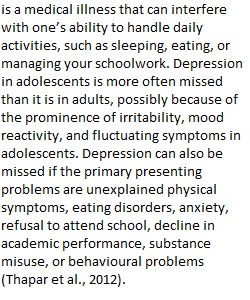


Q Write a discussion board post. Choose one of the following issues as it relates to adolescents: depression, alcohol abuse, eating disorders (such as anorexia and bulimia), smoking and vaping, teen pregnancy, sexually transmitted infections, or an alternative issue of your choice. 1. Research the issue using course materials and outside sources. Be sure to evaluate which sources are reliable sources of information. In your discussion board post, provide background information about the topic you chose as it relates to adolescents. Provide statistics, data, and facts and properly cite your sources as you discuss the issue in-depth. Who does this issue effect? Are there gender differences, racial and ethnic differences, urban vs. rural differences, or other distinctions you can find that are noteworthy? Be thorough in your investigative research. 2. Next, discuss some of the approaches that have been ineffective in addressing this issue in the past. Thoroughly describe why these approaches did not work, what their pitfalls were, and other contextual information such as when, how, and/or why these approaches were used. Be sure to cite your sources in your responses. 3. Finally, make recommendations on how to best address the issue you chose. How can this issue be addressed? What approaches are best and most effective? What do experts recommend? Be sure to properly cite your sources. What do you think is the right way to solve this problem, and why?
View Related Questions